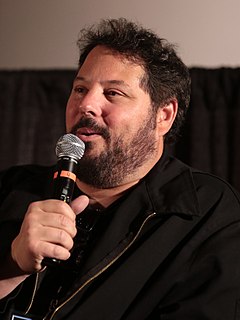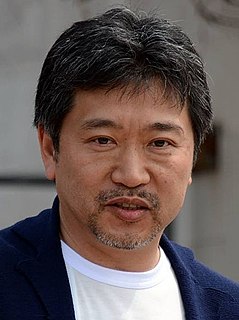A Quote by Michel Gondry
I try to learn from both, from features and documentaries. In both cases you have to find a way to make the camera as discreet as possible, and flexible enough to be able to capture the moment when it happens. I know from documentary how to not have a preconceived idea of what the scene could be.
Related Quotes
My job as an actor is to try to do what the director wants me to do. I'm going to do everything I can to incorporate that note and make it work. If it doesn't work, I'll try this kind of thing, and "How do you feel about that?" If you are at odds with the director, neither one of you is going to get anywhere. You really do have to be able to make both of you happy. Even when I was younger, there were times when you have to find a way to make it work for both of you.
It's difficult to make movies. For me it was easier, as a refugee in Switzerland, to make documentary films, because I didn't need a lot of money for it. The way I tell my story or my opinion would be very similar in both fiction and documentary forms. But I found I could speak more effectively to convey this brutal reality through documentary than I could through fiction.
Life is possible only through challenges. Life is possible only when you have both good weather and bad weather, when you have both pleasure and pain, when you have both winter and summer, day and night. When you have both sadness and happiness, discomfort and comfort. Life moves between these two polarities. Moving between these two polarities you learn how to balance. Between these two wings you learn how to fly to the farthest star.
I always try to find something or some way of delivering the lines or playing the scene that you wouldn't normally expect. And I know that sounds weird, because it's not like I surprise people with shocking performances. But in an interesting way... Just being real and as interesting as possible. Usually, that stuff is the spine of the show. It's the humor that you need in a scene, in an intense moment or something.
I love to just listen and watch. I could happily watch a security camera at a store. Often during a day I'll see a guy selling pretzels or an argument that somebody's having on a stoop and I'll think, "Oh I wish I had my camera, I wish I could capture this moment." There's something about people being people and interacting that can be so beautiful when it's framed by a camera. That desire to capture people as they are, and the stubbornness to keep going when they don't necessarily want you to capture them being who they are, are key.
The idea that a book can advise a woman how to capture a man is touchingly naive. Books advising men how to capture a woman are far less common, perhaps because few men are willing to admit to such a difficulty. For both sexes, I recommend a good novel, offering scenarios you might learn from, if only because they reflect a lot of doubt.
Meditation accepts us just as we are-in both our tantrums and our bad habits, in our love and commitments and happiness. It allows us to have a more flexible identity because we learn to accept ourselves and all of our human experience with more tenderness and openness. We learn to accept the present moment with an open heart. Every moment is incredibly unique and fresh, and when we drop into the moment, as meditation allows us to do, we learn how to truly taste this tender and mysterious life that we share together.
Whether it's one scene or 15 scenes in a film, whether it's the lead or a cameo part, if I don't find it interesting, I tend not to do it. You never really know what it is. It could be a one-scene part. I remember I read the one scene in Crash and was asked to do it. I was like, "Absolutely!" There's no formula for how something has to be. I always try to keep it that way.
Nothing in Chomsky's account acknowledges the difference between intending to kill a child, because of the effect you hope to produce on its parents (we call this “terrorism”), and inadvertently killing a child in an attempt to capture or kill an avowed child murderer (we call this “collateral damage”). In both cases a child has died, and in both cases it is a tragedy. But the ethical status of the perpetrators, be they individuals or states, could not be more distinct For Chomsky, intentions do not seem to matter. Body count is all.
It's not enough to have a dream, Unless you're willing to pursue it. It's not enough to know what's right, Unless you're strong enough to do it. It's not enough to learn the truth, Unless you also learn to live it. It's not enough to reach for love, Unless you care enough to give it Men who are resolved to find a way for themselves will always find opportunities enough; and if they do not find them, they will make them.





































